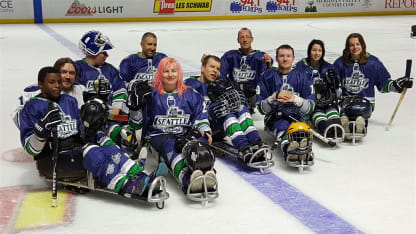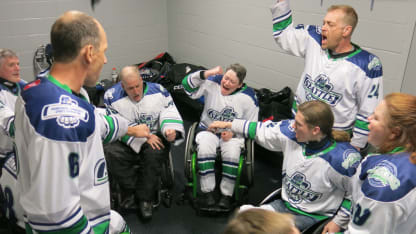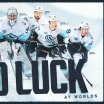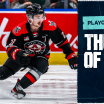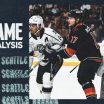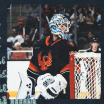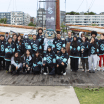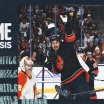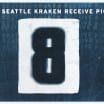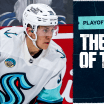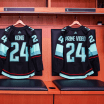"We all suck the first time," says Cupps, laughing. "But it's amazing and outstanding to be part of the team. It's important mentally for me to be able to physically do things I thought were lost."
Cupps was a competitive runner for many years. In 2012 while still in military service, she "got sick and it progressively got worse to where I can't use my legs to get around." Cupps has been diagnosed with hereditary spastic paraplegia or HSP, which is the term used for a group of rare inherited conditions that weaken and cause stiffness in the legs.
"SAS has supported me to find other ways to compete," says Cupps. "Sled hockey allows me to feel that same level of athleticism. I am embracing the difference."
As the NHL designates this week at "Disabled Hockey Week," Cupps' and Dawson's stories are just two of many to describe the spirit and joy of sled hockey, other forms of disabled hockey and the intersection of disabled individuals who are hockey fans and, in some cases, professionals working in the sport. The NHL marks the occasion as part of its "Hockey is for Everyone" program.
USA Hockey co-sponsors an annual "Toyota-USA Hockey Disabled Hockey Festival" that is scheduled for Pittsburgh April 8 to 11 and April 15 to 18, 2021. The festival brings together what USA Hockey deems to be the six disciplines of disabled hockey: sled (staging the national championship tournament), plus hockey for the blind, deaf/hard of hearing, special, standing amputee and warrior. For more information about the disciplines, festival and more, visit
https://www.usahockey.com/disabledhockey
.
For her part, Jill Ellison says she has "come full circle' in her professional life as a recreation therapist. In Michigan, she first gained professional experience working in adaptive sports working at the Detroit Medical Center and its renown wheelchair basketball teams and programs. She then moved West to work for Seattle Parks and Recreation, leading initiatives to encourage health and fitness, including an over-50 walking program, before moving into a senior role providing year-round activities for disabled individuals of all ages, including regular interaction with SAS to consult on facilities and spaces.
The move to SAS was a natural step for Ellison, who started in April and can't wait for full activities to resume again for SAS athletes and participants. "I enjoy making connections and building relationships with people and our community partners," she explains.
Relationships are a big part of the draw to sled hockey for Dawson: "For whatever reason, the camaraderie on our sled hockey is the most intense and more enjoyable than any stand-up hockey team I have played with," he says. "The national tournaments really bring it out, traveling together. Teammates share so much of their lives. Someone tells you something and then you open up more."
Dawson pauses and smiles before continuing: "At one tournament, we lost every game. But at the final team dinner you woud have thought we won the championship. There was so much laughter and fun. One of our players-he's 60-said it was first time in his life he truly felt part of a team."
Dawson admits to "learning a lot over the five years" about his own "biases and misconceptions." He supposed disabled people would be frail. Not the case, he now insists and his hard-checking teammate Leah Cupps among others is proof.
Another piece of evidence: "I can be dragging myself and my hockey bag toward the rink exit after a game or tournament," says Dawson, "and it's not uncommon to look up and see a paraplegic holding the door open for me."
For more information about local disabled hockey and Seattle Adaptive Sports, check out
www.seattleadaptivesports.org
.
